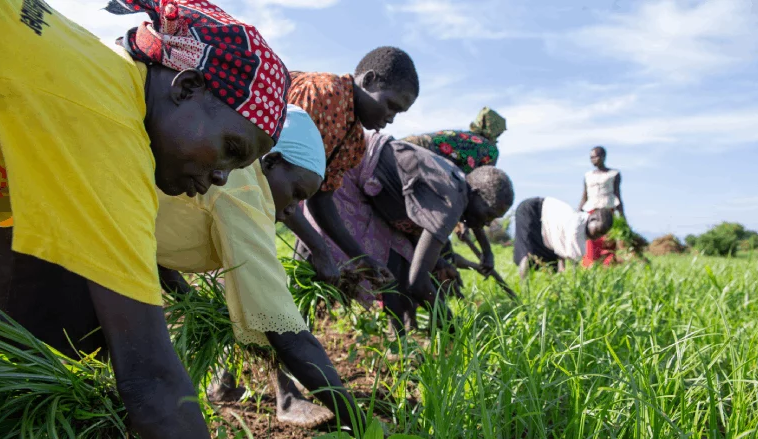Source: kidjo.com/mothernature
African women in music have recently assumed more leadership roles than before, and Angélique Kpasseloko Hinto Hounsinou Kandjo Manta Zogbin Kidjo, known as Angélique Kidjo, is one of them. Kidjo is recognised as a prominent and popular African musician, and for her unique blending of many musical traditions and her choice of music, she has always preached change in society. According to her, “you cannot transform the society of people if the people are not part of the change.”
The early years of Angélique Kidjo and her professional accomplishments will be covered in this article.
Born on the 14th of July, 1960, the Beninese-French singer and songwriter has remained one of the most decorated female musicians in African history, a five-time Grammy winner, and the 2023 Polar Music Prize laureate, the world’s most coveted music honour. She was raised in a musically accomplished household. Her mother worked as a theatre director and choreographer, while her father was a musician.
Her early musical influences were Miriam Makeba, Hugh Masekela, James Brown, Manu Dibango, Otis Redding, Jimi Hendrix, Fela Kuti, Stevie Wonder, Osibisa, and Santana, in addition to traditional Yoruba and Beninese music. Kidjo started acting at the age of six in her mother’s theatre company, and as a teenager, she sang in their rock-rhythm-and-blues band alongside her siblings. She began her career as a vocalist when she was 20. In 1988, she finished recording her debut album, Pretty.
Kidjo relocated to Paris in 1983, where she discovered a thriving music scene and a wide range of musical genres to play with. It was in Paris that Kidjo met Jean Hebrail, a French producer, composer, and bassist, whom she eventually got engaged to. During her initial years in the city, she studied jazz and participated in a number of local organisations. She collaborated with the Dutch pianist Jasper vant Hof to form the jazz group Pili-Pili, with whom she sang and co-wrote songs.
After a number of years, Kidjo departed Pili-Pili and released the 1991 album Logozo, which featured the African musicians Manu Dibango and Ray Lema as well as the American jazz performer Branford Marsalis. Logozo was a worldwide hit thanks to its songs about topics including homelessness, the environment, freedom, and integration. Later works by Kidjo, such as Fifa (1995), which featured her performing songs in Fon, Yoruba, French, English, and her native tongue, helped to broaden her influence internationally.
Kidjo’s early albums were experiments in musical fusion, combining a variety of genres like jazz, hip-hop, zouk, Zairean rumba, samba, salsa, funk, gospel, Cameroonian makossa, and diverse Beninese traditions. Her sixth solo album, Black Ivory Soul (2002), was a brilliant foray into Brazilian music that successfully merged a Latin sound sensibility with remnants of traditional West African rhythms. American artist Dave Matthews collaborated on Oyaya! (2004), and Peter Gabriel, Josh Groban, Carlos Santana, and other notable figures from the international popular music scene appeared on Djin Djin (2007). Spirit Rising (2012) was a compilation of live music, and Oyo (2010) was a cover album. Eve (2014), a tribute to African women primarily sung in Beninese languages, and Sings (2015), a collaboration with the Philharmonic Orchestra of Luxembourg, both won Grammy Awards for best world music albums. The Talking Heads album Remain in Light (1980) was performed by Kidjo in 2018, and with Celia the next year, she paid tribute to Celia Cruz, a Cuban-American singer. In 2021, Mother Nature first appeared.
Kidjo was a vocal supporter of women’s and children’s health and education in addition to her recording career. She was selected to serve as one of UNICEF’s goodwill ambassadors in 2002. The International Confederation of Societies of Authors and Composers (Confederation Internationale des Sociétés d’Auteurs et Compositeurs; CISAC) elected her as one of its four vice presidents in 2013. Spirit Rising: My Life, My Music, a memoir by Kidjo, was published in 2014.
The 62-year-old singer was listed by Time as one of the “100 Most Influential People in the World” in September 2021. The Forbes magazine list of “The 40 Most Powerful Celebrities in Africa” includes Kidjo for the first time as a woman. She is the first female singer from Africa to have sung in front of French President Emmanuel Macron and former American President Donald Trump.
Angelique’s Mother Nature performed better than Nigerian Wizkid, whose record-breaking album ‘Made in Lagos’ was nominated in the same category, to win the 64th Grammy Award for “Best Global Music Album” on April 3, 2022.
She delights in transcending cultural divides to showcase our common humanity and solidifies her legacy as one of the most distinctive and exceptional voices in the international music scene. She has continued to succeed.
Angelique Kidjo is one of the most celebrated and richest female musicians in Africa. Her estimated annual salary is $1 million, with an estimated net worth of over $5 million.


